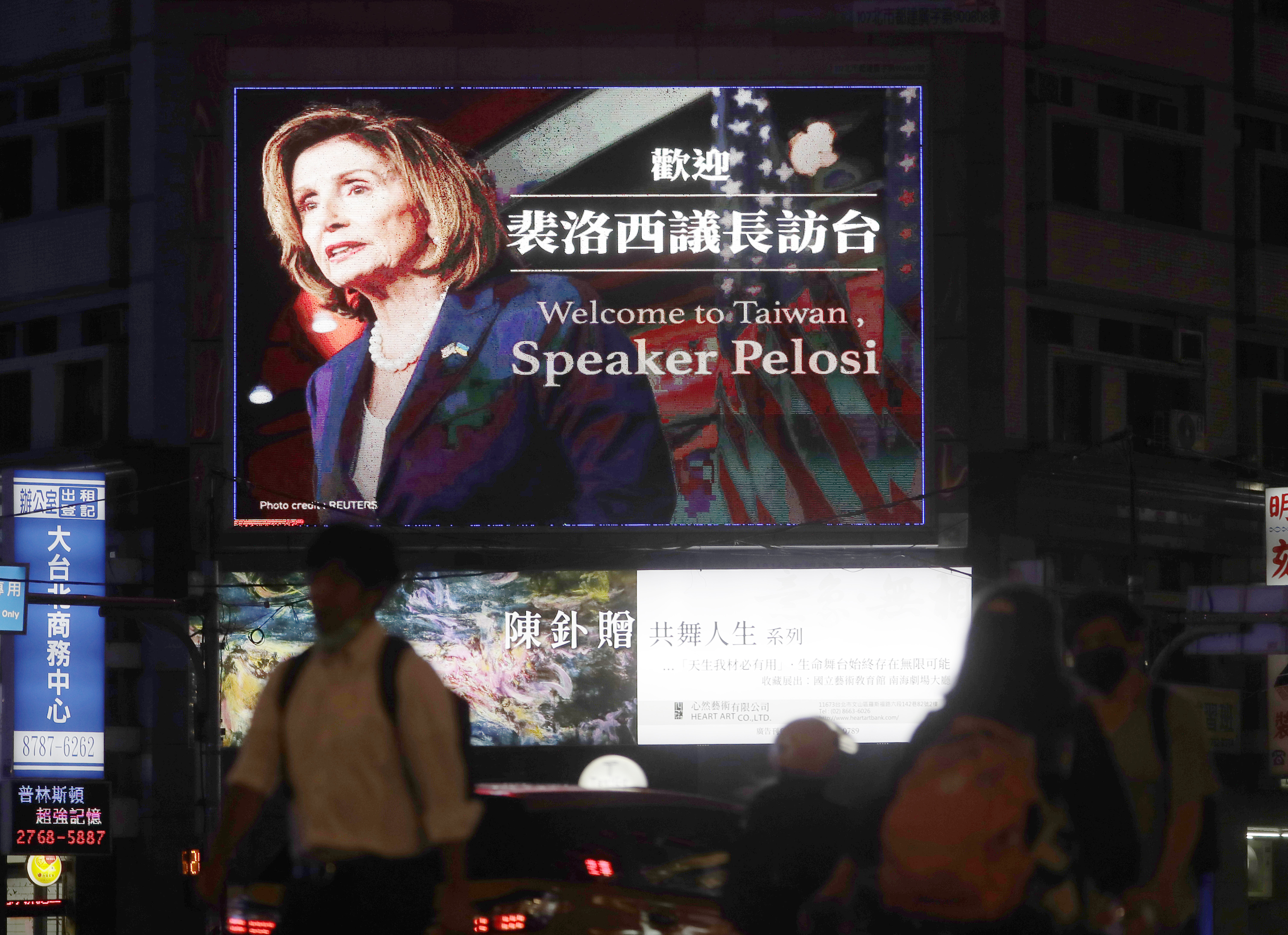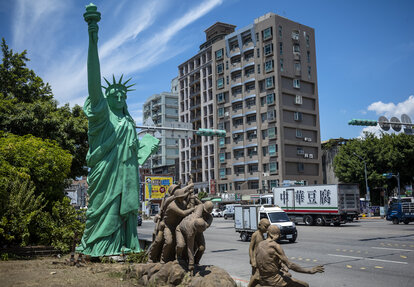China Bulletin
US-Taiwan Relations Over 45 Years: Building Trust Amid China Pressure

People walk past a billboard welcoming U.S. House Speaker Nancy Pelosi, in Taipei, Taiwan, Tuesday, Aug 2, 2022.
© picture alliance / ASSOCIATED PRESS | Chiang Ying-yingForty-five years ago, Washington broke off diplomatic relations with Taipei. This shock changed Taiwanese thinking in the long term. Democracy developed on the island and became a unifying element of US-Taiwan relations, which were revived after the Cold War. Today, relations are close - partly because of Beijing's aggressive policy.
On December 16, 1978, Chiang Ching-kuo, president of the Republic of China (ROC), was awakened with news that the U.S. would establish diplomatic relations with Beijing and sever ties with Taiwan starting January 1, 1979.
In his diary, Chiang wrote, “I am in agony. While shouldering heavy responsibilities, I must handle this rationally and calm the people down first.” It was a hard blow for Chiang and people of Taiwan.
Institutional response was swift— the U.S. Congress passed the Taiwan Relations Act in 1979, shaping U.S.-Taiwan relations to the present and guaranteeing Taiwan's security with provisions for defensive arms.
In contrast to the smooth institutional response between Washington and Taipei, the Taiwanese reacted roughly to the diplomatic fallout. The aftermath of severing ties in 1979 was profound for Taiwan’s collective mentality, fostering a sense of isolation and abandonment, an “orphan mentality.” as pointed out in media reports and analysis.

Replica of the Statue of Liberty in Taipei, Taiwan.
© picture alliance / ZUMAPRESS.com | Wiktor DabkowskiTaiwan's Orphan Mentality and Its Roots
The mentality in recent years even became a fertile ground for China's psychological warfare. Taiwan's disinformation researchers identified a 'US Skepticism' Theory, aligning with Chinese Communist Party (CCP) propaganda and influencing Taiwanese perceptions of the U.S. A 2023 survey showed a significant drop in trust towards the U.S—only 34 percent of Taiwanese regard the US as trustworthy – a drop of more than 11 percentage points since 2021.
This "gut feeling" among Taiwanese is somewhat validated by American policymakers and public opinion. While many U.S. politicians voice support for Taiwan, the majority prefer to avoid military confrontation with China, making support for Taiwan a complex issue.
U.S. public opinion mirrors this cautious approach. According to a September 2023 poll, 65% of Americans believe that U.S. security ties with Taiwan do “more to strengthen US national security.” Yet, if China were to invade Taiwan, only 39% of Americans would support sending U.S. troops to assist Taiwan. However, there's broad support for other forms of aid in such a scenario, with 75% favoring sanctions against China and 78% endorsing medical and food supplies for Taiwan.
Therefore, strengthening Taiwan's own military capabilities and bolstering public confidence in its defense strategy are practical and vital. The link between public confidence in the military and their readiness to defend Taiwan underscores this strategy's importance. 2023 Surveys among Taiwanese reveal that 95% of those confident in Taiwan's military are ready to fight, compared to just 65% of those with less confidence, showing a notable 30% difference.
The question of how best to arm Taiwan remains open. Perhaps, instead of substantial aid—like the Biden administration's grants for purchasing American military equipment—a focus on shaping the narrative to both deter U.S. skepticism and enhance Taiwan's confidence in its military power is equally important.
Democracy: A Shared Interest between Taiwan and the U.S.
Despite the diplomatic severance, Taiwan's journey towards democracy continued to be a common interest shared with the U.S. since the Cold War. A critical moment occurred in 1995-1996 when ROC President Lee Teng-hui's U.S. visit angered the PRC. China's subsequent military drills and missile tests, aimed at intimidating Taiwan, instead fueled Taiwan public’s democratic resolve.
Since the 1995-1996 crisis, tensions between the U.S., Taiwan, and the PRC have appeared to "cool down" on the surface. The Bush administration maintained a policy of strategic ambiguity alongside the One-China policy. In 2000, Taiwan saw its first historic political party shift, electing Chen Shui-bian of the DPP, whom Bush reportedly considered a "troublemaker" for his provocative stance on the status quo.
In 2016, a deviation occurred when President-Elect Trump spoke with Taiwanese President Tsai Ing-wen, marking the first direct communication between U.S. and Taiwanese leaders since diplomatic ties were severed. This was followed by continued U.S. support under the Biden administration, notably highlighted by House Speaker Nancy Pelosi's visit in 2022.
Conclusively, the essence of today's U.S.-Taiwan relations pivots on Taiwan's faith in its military prowess and the necessary support of the U.S., intertwined with their shared dedication to democratic principles. This combination is essential for Taiwan to confidently navigate the complexities of regional geopolitics.
2024 U.S. Election and Its Implications for Taiwan-U.S. Relations
China and Taiwan will significantly impact the 2024 U.S. election. Americans see China as a major challenger to U.S. global leadership, prompting bipartisan efforts to contain its rise.
Even as the Biden administration has worked to lower tensions with China through bilateral meetings, walking the tightrope of the “One China Policy” looks to grow increasingly difficult. The potential re-election of Trump could escalate U.S.-China tensions, likely leading to a hawkish administration eager to increase military support for Taiwan.
While support for Taiwan and distrust towards China is bipartisan, the 2024 election will be a turning point for whether the U.S. will seek to coexist with China, or if hawks will turn towards a more belligerent foreign policy that will raise tensions between the two countries. Amid these strategic decisions, prioritizing both democratic values and the maintenance of peace should remain paramount.
Judy Peng is a communications officer at the FNF office in Taipei. She is a journalist by training.
Adam DuBard is a Senior Program Associate for the World Order and Globalization Hub in Washington, D.C. Originally from South Carolina, he has lived in Germany, Jordan and Italy for a total of two years, where he gained proficiency in German, Italian and Arabic. He has more than six years of experience in nonprofit organizations and has published writing in Pass Blue, Inkstick and The Hill. He is a graduate of the Johns Hopkins School of Advanced International Studies, where he earned an M.A. in conflict management and international business, and also holds a B.A. in political science and German from the University of South Carolina.

